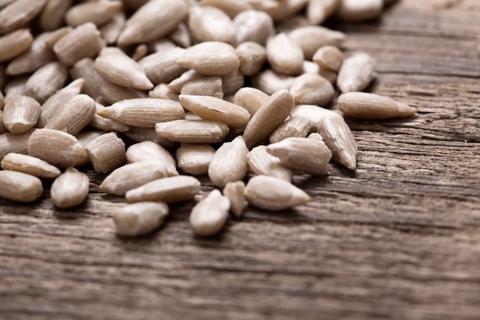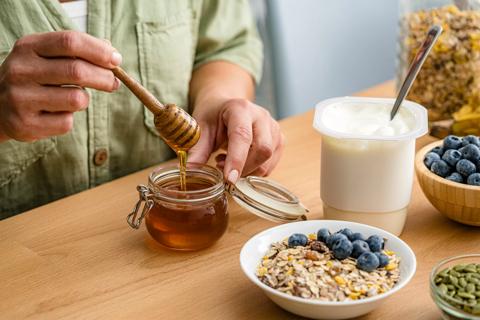Advertisement
These nuts are packed with healthy monounsaturated fat, protein and calcium

We’ve all heard that nuts are good for us. But is there one that reigns above all others? A lot of evidence suggests that the almond may be in the running as far as health benefits go.
Advertisement
Cleveland Clinic is a non-profit academic medical center. Advertising on our site helps support our mission. We do not endorse non-Cleveland Clinic products or services. Policy
Like many other nuts, almonds are high in fat — but that’s not a bad thing. This is because they’re packed with healthy monounsaturated fat. Evidence suggests that monounsaturated fats, like the ones found in the Mediterranean diet, have a positive impact on your heart health.
Plus, almonds are known to be an easy, go-to snack. You can enjoy them in a variety of ways such as whole almond milk, almond butter and almond flour, making them a versatile and convenient ingredient for many recipes.
Dietitian Julia Zumpano, RD, LD, helps unpack the details about this highly nutritious nut.
Almonds are a rich source of fiber, protein, healthy fats, vitamin E, magnesium, phosphorus and potassium. These nutrients play critical roles in many bodily functions, like energy production, cell growth and immune function.
Here’s what makes almonds healthy for you:
If you read the nutrition label for almonds, you may notice they’re higher in fat than other foods you’re used to consuming. Don’t be alarmed by this. Almonds are high in monounsaturated and polyunsaturated fats, which are considered “healthy” fats.
Why is this important? Well, these fats are good for your heart because they can lower your bad cholesterol and raise your good cholesterol. So, if you’re trying to manage your cholesterol, almonds are a good snack choice to keep handy.
In addition, almonds have slightly fewer carbohydrates compared to other nuts and make a good snack option for people with diabetes or those following a low-carb diet. The amount of fiber found in almonds is especially important if you have Type 2 diabetes. The fiber in almonds keeps your blood sugar more stable, which reduces the risk of having a spike in blood sugar.
Because of their high calcium content, almonds can also support bone and teeth health. Especially if you’re not a big dairy drinker or have a dairy sensitivity, a handful of almonds can help keep your diet balanced. Plus, they contain magnesium, zinc, vitamin K and manganese, which can contribute to bone health as well.
Almonds are a good source of antioxidants, including vitamin E and flavonoids. These help protect cells from damage caused by free radicals and oxidative stress. A 2022 meta-analysis found that eating about 60 grams (about 2.25 ounces) of almonds a day helped reduce inflammation in the body. Almonds are especially known for their high abundance of vitamin E, which is an antioxidant that can help protect the brain from oxidative stress and inflammation.
Advertisement
You may be wondering if having almonds that have a bit of an extra kick of flavor or spice can still give you the same health benefits. Roasted almonds are simply almonds that have been heated in an oven or on a stovetop. This can help bring out the natural oils in the almonds, making them more flavorful. “Keep in mind some antioxidants can be lost in the heating process,” points out Zumpano. “So, for the most nutritional benefit choose raw almonds.”
Flavored almonds, on the other hand, are almonds that have been coated with a flavoring or seasoning. This can include sweet flavors like honey, cinnamon or chocolate, or savory flavors like salt and vinegar, barbecue or garlic. The flavorings can be added to the almonds before or after roasting, depending on the recipe.
Whether you’re reaching for roasted, flavored or plain almonds, you’ll likely get the same amount of nutrients no matter what you choose. While both roasted and flavored almonds can be a tasty and healthy snack, remember that these can include unhealthy oils, added salt and sugar, which can contribute to increased blood sugars, blood pressure, inflammation and even cholesterol due to the added oils. “It’s important to read the labels carefully and choose brands that use natural ingredients and avoid excessive amounts of added sugars, salt or artificial flavors,” recommends Zumpano.
If you’re looking to add a healthy nut to your snack rotation or meal routine, almonds are a great option to throw into your trail mix, salad or even a favorite dinner recipe. Sometimes, we all just need an easy bite-sized treat that gives our body just what it needs. Happy almond snacking!
Advertisement
Learn more about our editorial process.
Advertisement

With a sweet, tangy flavor, this tropical fruit is super versatile and high in antioxidants

Raisins have a number of health benefits when eaten — but raisin water probably won’t do much for you

Full of antioxidants and nutrients, apricots may boost your eye, skin, digestive and overall health

These tiny but mighty seeds can help fight cancer and inflammation and support thyroid health

Its health benefits are impressive, but it’s still liquid sugar, so be sure to consume honey in moderation

A change in diet won’t cure COPD — but getting to or maintaining a healthy weight will help

Juicing cleanses don’t target fat loss — and you’ll lose important nutrients in the process

These trendy fungi may promote a healthy brain, heart and gut, but more research is needed to say for sure

Your metabolism may torch 1,300 to 2,000 calories daily with no activity

A gentle touch in all the right places may help drain your sinuses